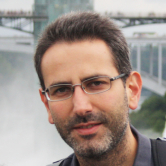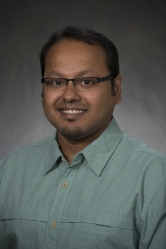Oldridge Lab
The Oldridge lab studies the intricate spatial biology of intact tissues, combining cutting-edge spatialomic techniques with advanced computational, statistical, and AI-driven analytic methods. These approaches are used to deeply profile tissues with hundreds to thousands of molecular markers in a spatially detailed manner, in order to better understand the molecular, cellular, and structural basis of human health and disease.
Read more
Deng Lab
Development and application of new technologies for spatial omics profiling at the cellular level, specifically tools at the intersection of microchip, microscopy, genomics, and computational analysis to profile genome, epigenome, transcriptome, and proteome within the spatial context of tissues and cells.
Principal Investigator: Yanxiang Deng, PhD
Read more
Penn Path & Lab Professor Dr. Malek Kamoun and Dr. Ryan Urbanowicz of Cedars-Sinai Medical Center are developing machine learning strategies to improve matching in kidney transplants and decrease the risk of recipient graft failure. This summer, they received help from three Penn students through the Penn Undergraduate Research Mentoring Program.
Read more
Assistant Professor of Pathology and Laboratory Medicine
Perelman School of Medicine at the University of Pennsylvania
Contact Information
Stellar Chance Laboratories 505A (office) /508 (lab)
422 Curie Boulevard
Philadelphia, PA, 19104
Office: 203-550-7704
Email: manolis.roulis@pennmedicine.upenn.edu
Function and architecture of the mesenchymal microenvironment in tissue homeostasis, immunopathology and cancer
More Info
Enrique Olguín-Martínez, PhD, a postdoctoral fellow in the Henao-Mejia lab studying how diet-induced inflammation promotes childhood obesity, has been named a 2023 Pew Latin American Fellow in the Biomedical Sciences. He will be mentored by an alum of the Pew Scholars Program in the Biomedical Sciences - Dr. Jorge Henao-Mejia.
Read more
Featuring postdoctoral fellow Dr. Mayassa Bou-Dargham, a $25 million gift for a Center for Epilepsy and Neurodevelopmental Disorders, the first cohort of the AABB's certified Advanced Biotherapies Professional (CABP) credential, research grants for Drs. Saba Ghassemi and Christopher Sande, a podcast on laboratory preparedness for the current monkeypox outbreak by Dr. Kyle Rodino, and Dr. Roseann Wu, who joins the American Board of Pathology’s Test Development and Advisory Committee for Cytopathology.
Read more
Assistant Professor of Pathology and Laboratory Medicine
Perelman School of Medicine at the University of Pennsylvania
Contact Information
Department of Pathology and Laboratory Medicine
Perelman School of Medicine at the University of Pennsylvania
Stellar-Chance Laboratories
422 Curie Boulevard, Room 713A
Philadelphia, PA 19104
Email: Yanxiang.Deng@Pennmedicine.upenn.edu
Research Expertise
Spatial omics, Single-cell analysis, Microfluidics
More Info
Haldar Lab
Mononuclear phagocyte system (MPS) with an emphasis on their role in the tumor microenvironment
Principal Investigator: Malay Haldar, MD, PhD
Read more
Associate Professor of Clinical Pathology and Laboratory Medicine
Perelman School of Medicine at the University of Pennsylvania
Associate Director, Histocompatibility Testing Laboratory
Contact Information
Hospital of the University of Pennsylvania
Department of Pathology and Laboratory Medicine
7.019 Founders Pavilion
3400 Spruce Street
Philadelphia, PA 19104
Tel: 215-615-7789
More Info
Associate Professor of Pathology and Laboratory Medicine
Perelman School of Medicine at the University of Pennsylvania
Associate Program Director, Physician-Scientist Pathway (PSP),
HUP Pathology Residency Program
Contact Information
Department of Pathology and Laboratory Medicine
Perelman School of Medicine at the University of Pennsylvania
Biomedical Research Building (BRB) II/III, Rm. 413
421 Curie Boulevard
Philadelphia, PA 19104
Tel: 215-573-9704
Fax: 215-746-5511
Email: mhaldar@pennmedicine.upenn.edu
Research in our laboratory is at the intersection of innate immune system and solid tumor biology. Specifically, we study the mononuclear phagocyte system (MPS) with an emphasis on their role in the tumor microenvironment. MPS is part of the innate immune system and comprises of monocytes, macrophages, and dendritic cells (DC). These cells are functionally, phenotypically, and developmentally heterogeneous with many distinct subsets. We are interested in understanding the molecular basis of this developmental and functional heterogeneity within the MPS. A major focus in our laboratory is to understand the role of MPS within the microenvironment of a group of solid tumors known as sarcomas. DCs and macrophages are thought to play important role in cancer by modulating host-immune responses against the tumor cells, promoting metastasis, angiogenesis, etc. Additionally, the ability of these cells to regulate lymphocyte function makes them an important determinant in the success of cancer immunotherapy. Using a combination of advanced genetically engineered mouse models in conjunction with patient-derived samples, we aim to uncover the molecular pathways underlying tumor-MPS interaction with the overarching goal of targeting them for therapeutic purposes.
More Info
Pages






